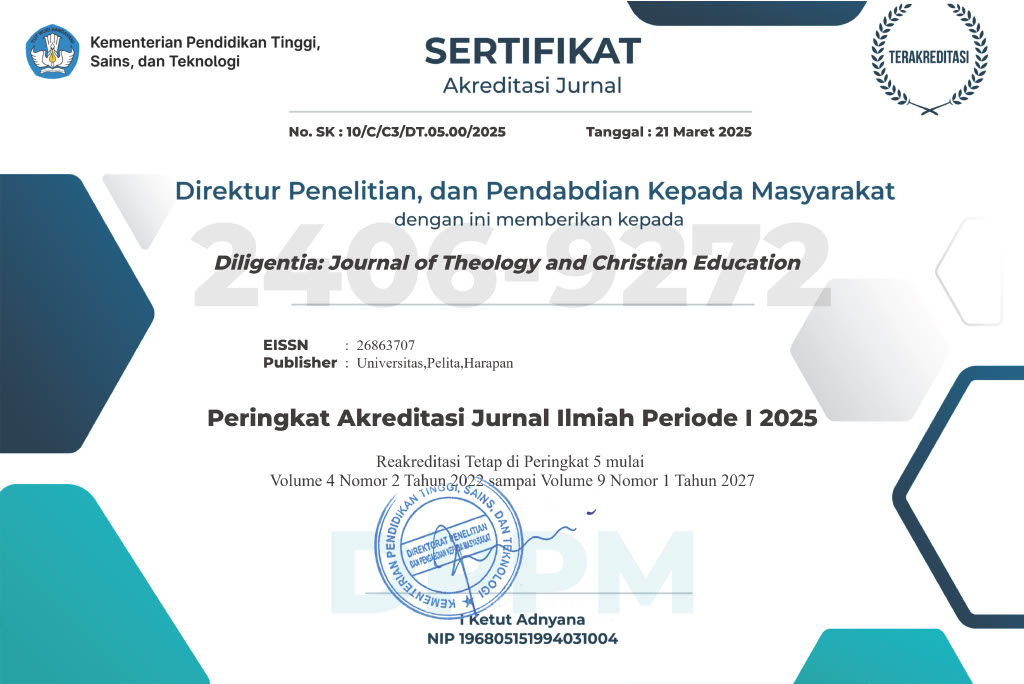Why Christian Schools Should Adopt Restorative Justice?
DOI:
https://doi.org/10.19166/dil.v2i1.2121Keywords:
Christian Education, Discipline, Retributive justice, Restorative DisciplineAbstract
Christian schools have the responsibility to teach students to view everything from God’s perspective. Hence, all components of Christian education, including discipline practices, should be based on the Bible. Traditionally, the discipline approach in schools is mainly retributive justice that focuses on the rules that are broken, the offenders and the punishments. The offenders should get the deserved punishment for breaking the rules. A different approach, that is restorative justice, focuses on addressing the harm caused, the victims’ feeling and restoring the broken relationship caused by the offense through reconciliation. To find the most biblical approach to be implemented in Christian schools, this paper first looks at the presupposition of both approaches through literature studies and then review it in the light of the Word of God. The result is apparent that restorative justice should be adopted by Christian schools in order to stay faithful to the mandate which is to bring students to God. Further arguments on the importance of adopting this approach are presented concisely. Nevertheless, more research is needed in this area to ensure successful implementation.
References
Armour, M. “Restorative Justice: Some Facts and History.” Tikkun, 2012. https://doi.org/10.1215/08879982-2012-1012
Ashford, Bruce Riley. Every Square Inch: An Introduction to Cultural Engagement for Christians. Bellingham, WA: Lexham Press, 2015.
Broughton, Geoff. “Restorative Justice: Opportunities for Christian Engagement.” International Journal of Public Theology 3, no. 3 (2009): 299-318. https://doi.org/10.1163/156973209x438265
Cameron, Lisa, and Margaret Thorsborne. “Restorative Justice and School Discipline: Mutually Exclusive?” Reshaping Australian Institutions Conference “Restorative Justice and Civil Society” ,Australian National University, Canberra, February, 1999, 1999, 1-19.
Estep Jr., James R., Michael J. Anthony, and Gregg R. Allison. A Theology for Christian Education. Nashville, TN: B&H Publishing Group, 2008.
Evans, Katherine, and Dorothy Vaandering. The Little Book of Restorative Justice in Education: Fostering Responsibility, Healing, and Hope in Schools. New York, US: Good Books, 2016.
Hurley, Nancy, Sarah Guckenburg, Hannah Persson, Trevor Fronius, and Anthony Petrosino. “Restorative Justice in U.S. Schools: A Research Review,” 2016.
Hurley, Nancy, Sarah Guckenburg, Hannah Persson, Trevor Fronius, and Anthony Petrosino. “What Further Research Is Needed on Restorative Justice in Schools?.” WestEd, 2015. https://eric.ed.gov/?id=ED559727
Josephson Institute Center for Youth Ethics. “2012 Report Card on the Ethics of American Youth - Honesty,” 2012.
Kienel, Paul A., and Gibbs Ollie E. Philosophy of Christian School Education. Edited by Berry Sharon E. Colorado, US: ACSI Publisher, 1982.
Linde, Sharon. “Disciplinary Problems in the Classroom: Types & Causes.” Study.com. Accessed December 6, 2019. https://study.com/academy/lesson/disciplinary-problems-in-the-classroom-types-causes.html
MacCullough, Martha E. Undivided: Developing a Worldview Approach to Biblical Integration. Colorado: Purposeful Design Publications, 2016.
Manogu, Ridwanta. “A Theological Review of Approaching Models in the Dialog of Faith and Science.” Diligentia, no. 1988 (2019): 35. https://doi.org/10.19166/dil.v1i1.1889
Marshall, Chris. “Divine Justice as Restorative Justice.” Center for Christian Ethics, 2012, 11-19.
Marshall, Christopher D. Beyond Retribution: A New Testament Vision for Justice, Crime, and Punishment. Grand Rapids, MI: Eerdmans, 2001.
Marshall, Christopher D. The Little Book of Biblical Justice: A Fresh Approach to the Bible’s Teachings on Justice. New York, US: Good Books, 2005.
Nansel, Tonja R., and Wendy Craig. “Cross-National Consistency in the Relationship Between Bullying Behaviors and Psychosocial Adjustment.” Archives of. Accessed December 6, 2019. https://www.ncbi.nlm.nih.gov/pmc/articles/PMC2556236/
Osaka, Yutakabe. “Lost in Translation : An Analysis of Christian Restorative Justice Advocacy in Britain A Thesis Presented for the Degree of Doctor of Philosophy in Divinity at the University of Aberdeen By Yutaka Osakabe September 2018.” University of Aberdeen, 2018.
Skiba, R. J., and K. Knesting. “Zero Tolerance, Zero Evidence: An Analysis of School Disciplinary Practice.” New Directions for Youth Development 92 (2001): 17-43. https://doi.org/10.1002/yd.23320019204
Skinner, B. F. The Behavior of Organisms: An Experimental Analysis. New York, US: Appleton-Century, 1938.
Tung, Khoe Yao. Pembelajaran Dan Perkembangan Belajar. Jakarta, Indonesia: Indeks, 2015.
Wachtel, Ted. “Defining Restoration.” Defining Restoration, 2016.
Walen, Alec. “Retributive Justice.” The Stanford Encyclopedia of Philosophy, 2016. https://doi.org/10.1007/978-1-4939-3216-0_13
“What Is Christian Education?” Accessed December 9, 2019. https://www.cen.edu.au/index.php/shortcode/what-is-christian-education
Whelchel, Hugh (Institute for Faith, Work & Economics). “All Things New: Rediscovering the Four-Chapter Gospel.” McLean, VA : Institute for Faith, Work & Economics, 2016.
Wilson, Douglas. The Case for Classical Christian Education. Wheaton, IL: Crossway Books, 2003.
Zehr, Howard. Changing Lenses: A New Focus for Crime and Justice. Third Edit. Waterloo, Netherlands: Herald Press, 2005.
Zehr, Howard. The Little Book of Restorative Justice. New York, US: Good Books, 2014.
mso-ascii-theme-font:minor-latin;mso-fareast-font-family:Calibri;mso-fareast-theme-font:
minor-latin;mso-hansi-theme-font:minor-latin;mso-bidi-font-family:Arial;
mso-bidi-theme-font:minor-bidi;mso-ansi-language:EN-ID;mso-fareast-language:
EN-US;mso-bidi-language:AR-SA'>
Downloads
Published
How to Cite
Issue
Section
License
Authors who publish with this journal agree to the following terms:
1) Authors retain copyright and grant the journal right of first publication with the work simultaneously licensed under a Creative Commons Attribution License (CC-BY-SA 4.0) that allows others to share the work with an acknowledgement of the work's authorship and initial publication in this journal.
2) Authors are able to enter into separate, additional contractual arrangements for the non-exclusive distribution of the journal's published version of the work (e.g., post it to an institutional repository or publish it in a book), with an acknowledgement of its initial publication in this journal.
3) Authors are permitted and encouraged to post their work online (e.g., in institutional repositories or on their website). The final published PDF should be used and bibliographic details that credit the publication in this journal should be included














